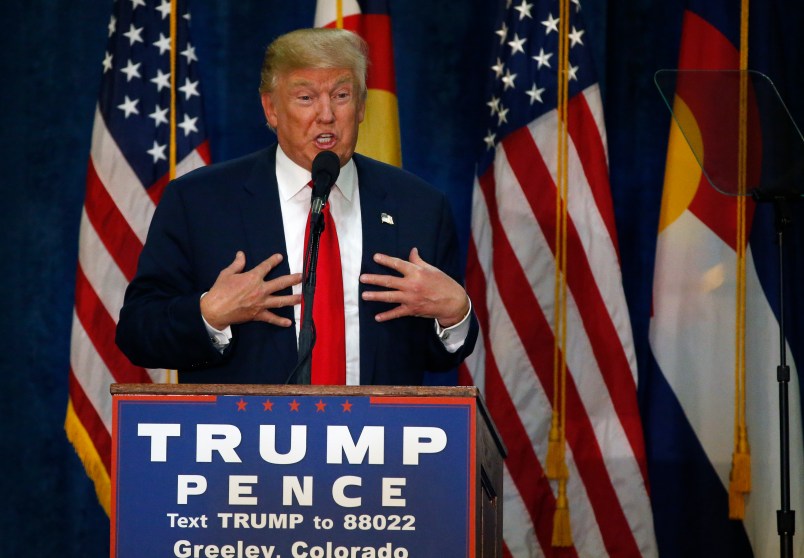Donald Trump on Wednesday asked the Supreme Court to consider his bid to stay on Colorado’s primary ballot, taking the question over whether his conduct on Jan. 6 disqualifies him for office to the High Court.
Trump put forth several arguments in the petition which offer the Supreme Court a way to keep him on the ballot without wading into the incredibly consequential question of whether egging on a mob to disrupt the transfer of power constitutes an insurrection.
Attorneys for the former president argued that only Congress could decide whether Section 3 of the 14th Amendment applied to Trump, and also offered up the theory that the provision does not apply to presidents.
The filing formally appeals a ruling last month from the Colorado Supreme Court, which held that the Constitution’s Disqualification Clause covered Trump’s efforts to stay in power, which included whipping up a mob of his supporters and urging them toward the Capitol on Jan. 6. The state Supreme Court affirmed a decision from the trial court, which held a week-long evidentiary hearing, that Trump’s actions on Jan. 6 amounted to insurrection.
In the petition, Trump also said that he would want the Supreme Court to “reverse the Colorado Supreme Court’s holding that President Trump ‘engaged in insurrection.'”
The High Court could, at this stage, make the unlikely decision to decline to hear the case, leaving Trump disqualified on the Colorado primary ballot and opening up the prospect of piecemeal disqualification in states across the country.
But the filing from Trump — along with an earlier petition last week from the Colorado GOP — all but assures that the Supreme Court will take a virtually untested question which goes to the core of American democracy. Trump was the only president in U.S. history to reject the will of voters and use force to block it: Does that set of facts bar him from holding office?
In the petition, Trump repeatedly cited an obscure 1869 case involving then-Supreme Court Chief Justice Salmon Chase which dealt with the Disqualification Clause and Congress. Attorneys for Trump have returned to the case over and over again in disqualification lawsuits because Chase, while riding circuit, ruled that Congress needed to act to enforce the Disqualification Clause. In that case, his ruling preserved a conviction for attempted murder after a black man who faced the charge filed an appeal under Section Three, saying that the former Confederate who served as a judge in the case was disqualified.
Throughout the brief, Trump elides the sheer anomalousness of his actions after his defeat in the 2020 election. Instead, he casts the question presented to the court as whether the judiciary will act to remove him from the ballot — a move that he says would “disenfranchise tens of millions of voters nationwide.”
The Colorado decision, made in a 4-3 vote, has already rippled through several other states considering whether to bar Trump from the ballot. In Maine, the Secretary of State cited the Colorado decision in finding last week that Trump was disqualified; Trump sued to overturn that decision on Tuesday.
Justices on the Colorado Supreme Court issued an automatic stay after disqualifying Trump, which included a provision that would stay the ruling as long as Trump appealed the decision before Jan. 4.
“We do not reach these conclusions lightly,” justices in the Colorado majority wrote in their opinion. “We are mindful of the magnitude and weight of the questions now before us. We are likewise mindful of our solemn duty to apply the law, without fear or favor, and without being swayed by public reaction to the decisions that the law mandates we reach.”
Read the petition here:







Unanimous decision predicted.
Eligible.
Concurring opinions from open minded liberal justices will be a good read for way which 14/3 could be applied
“The Court should also overturn the finding that I have small paws. My paws are the bigliest paws, ever.”
States’ Rights Absolutists will decide that States have no rights here, even though all election laws are state-based. And the SC’s Year 2000 Presidential interference in Florida was just a one-time thing.
(( Further proof that there is no God means that no heads will explode due to the raging hypocrisy. ))
According to previous filings by TGF, should not this have to go to a lower Federal Court first?
@txlawyer?
Appeal from a state supreme court goes directly to SCOTUS. Indeed, you can’t even get into the lower federal courts on such an appeal.